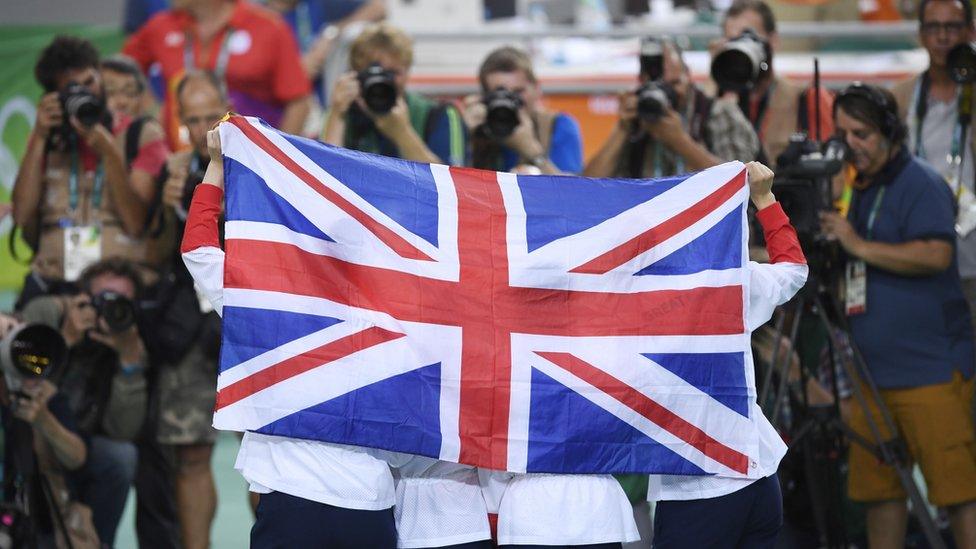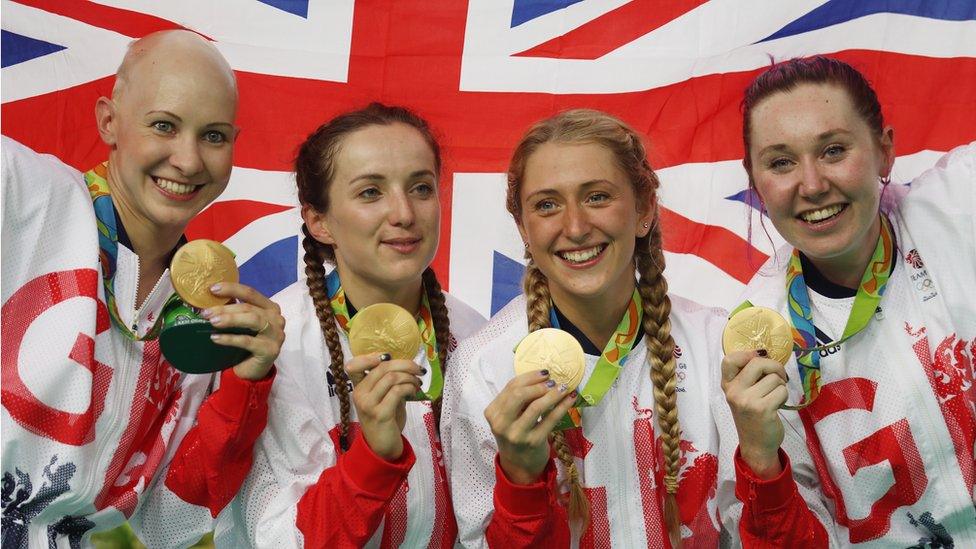World asks just how the Brits do it
- Published

The overwhelming success of Team GB has impressed world media
The media in a number of countries have been asking what lies behind the success rate of British athletes at the Rio Olympics.
The large number of medals won by the cyclists of Team GB has come in for particular attention.
Punching above their weight
The Sydney Morning Herald, external notes that compared with Britain, Australia has not done very well in the Games, despite having adopted a similar funding strategy in its search for Olympic success.
"In all, $340m has been injected into summer Olympic sports using the national lottery funding model adopted by Great Britain in the lead-up to its home Olympics as an inspiration," the paper says.
"But while Team GB... are still enjoying the afterglow of London by punching well above their weight here, the jury is still out for Australia's program."
In a separate report, external, the paper said that when Cycling Australia boss Kevin Tabotta was asked what made British cycling so good, he replied: "If I had the blueprint, I'd be using it myself."

Britain's 'golden girls'
An article on Sina's Weibo, external, the popular Chinese microblogging platform, also wonders what the UK's "secret" is, noting that direct funding from the National Lottery was "allocated to sports management and research institutions" for "a 'world-class project'".
French business daily Les Echos, external believes it has the answer. Asking "Why do the British swipe so many medals?", it suggests that "to understand why Britain is doing so well this year", one needs to remember that its "direct competitor, the Russian team, was heavily penalized".

'Why do the British walk off with so many medals?, asks France's Les Echos
Raised eyebrows
A Russian sports news website, Sport Express, external, carries a report headlined "Britain sets medal record for non-domestic Olympics".
The brief report is followed by a somewhat jaundiced comment from a reader identified as "S-E fan", who asks: "What's so surprising about this? The British have seized key posts at Wada, IAAF, the Paralympic Committee. Their people are everywhere, they are securely covered and compete and train without hassle."

Comment on Russia's Sport Express website offers 'explanation' for Britain's success at Rio
Several competitors in Rio have expressed astonishment at Team GB's performance.
Australia's Olympic team captain Anna Meares was said to have "raised her eyebrows", external at Britain's track cycling success, while Germany's champion cyclist Kristina Vogel asked how it was possible that Britain's cyclists could do so well at the Olympics after failing to score any other notable successes in the previous few years.
Anna Meares later took to Twitter, external to make it clear that she had not intended to suggest that the British team had been doing anything suspicious.
'£ycling'
French ex-cyclist, ex-coach and now columnist Antoine Vayer has been posting a number of provocative tweets aimed at British cyclists, with the latest simply stating: "£ycling".

But the French paper Le Telegramme, external believes the British sprinters' superior muscle power is what gives them the edge over their competitors.
"Sprint is fast becoming above all a sport of strength, in which the emphasis is on muscle power - perhaps excessively so for the purists," it says.
Meanwhile, English-language Chinese sources are being magnanimous about Britain's Rio successes but the Chinese-language papers are not happy about lagging behind Britain in the medals table.
Nationalist newspaper Huanqiu Shibao, external says there is "British media excitement over gold medals overtaking China" but the paper stresses that this is only "temporary".
'British cyclists got better'
The UK sports minister, Tracy Crouch, has criticised countries who have raised questions about the dominance of the British cycling team at the Rio Olympics.
She said the comments were "unfair" - and British cyclists had simply got better than their opponents.
The head British cycling coach has said the GB team always aimed to peak at the Olympics.
BBC Monitoring reports and analyses news from TV, radio, web and print media around the world. You can follow BBC Monitoring on Twitter, external and Facebook, external.